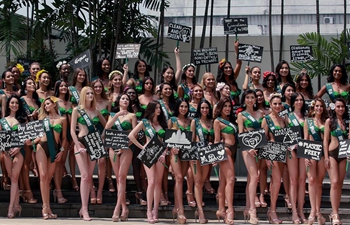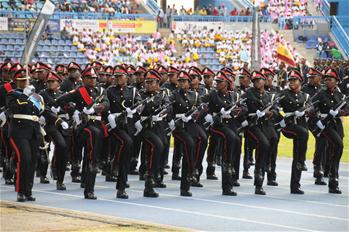GAZA, Oct. 2 (Xinhua) -- After waiting for three months, Yousef Abdulla, the 35-year-old resident of Gaza city, has finally received his passing permission from the Israeli side, which would enable him to work in Israel.
Without the permission, Abdulla, who works in the fields of metalwork and construction, won't be able to enter Israel through Erez Crossing Point on the border between the northern tip of the Gaza Strip and Israel.
The past recent weeks have witnessed increasing number of Palestinians applying for Israeli passing permissions, which enable them to work in Israel in various fields.
The number of Palestinian appliants has been increasing after Israel announced that it would allow some 5,000 Palestinians from Gaza to work in Israel.
After receiving his passing permission, Abdulla works eight hours daily in Israel as a blacksmith.
"I do stay overnight in Israel for five days and go back home on the weekends in order to save the cost of transportation," Abdulla said, adding that he makes 350 U.S. dollars per week.
The worker explained that his weekly income in Israel makes his living conditions better and that he managed to pay some of his debts, which had been accumulated for 12 years.
As husband and father of five from the southern Gaza Strip city of Khan Younis, Abdulla told Xinhua that "working in Israel was like a daydream," adding "I have never imagined that one day I will find a job and make such good money amid an Israeli siege imposed on the Gaza Strip for 12 years."
Abdullah said that he has been passing through a very poor living situation for 12 years and was imprisoned by the Islamic Hamas movement police forces because he was unable to pay back his debts.
He said "Israel also doesn't care about us and always wages wars and airstrikes on Gaza," adding "the weekly marches in Gaza are a real explanation of the young men's outrage against the hard political, social and economic situation."
The weekly marches of return were organized against Israel as a major mean of exerting pressure on Israel to ease the blockade it has imposed on Gaza since 2007.
According to the Palestinian Ministry of Health in Gaza, since the beginning of the weekly marches and protests in late March last year, the Israeli army forces shot and killed 312 Palestinian demonstrators and wounded thousands by live ammunition.
The rallies put international pressure on Israel, prompting some of its political allies to find alternatives. Implementing understandings with Palestinian factions in the Gaza Strip was the best and most effective recourse, Gaza-based analyst Hossam Dajani told Xinhua.
"Israel failed to tighten the blockade on Gaza, and the marches played the most prominent role in advancing the implementation of the understandings reached between Hamas and Israel and mediated by Egypt, Qatar and the United Nations," said Dajani.
Israeli sources had unveiled that Israel had reached unofficial understandings with Hamas movement to increase the number of workers into Israel in order to ease the Israeli blockade.
Hamas officials declined to comment on it. However, Khalil al-Hayya, a senior Hamas leader in Gaza, told reporters that the recent facilitations are the fruits of the ongoing marches.
Maher Taba'a, the public information chief of Gaza Chamber of Commerce, told Xinhua that Israel pledged to increase the numbers of passing permissions granted to the workers in the Gaza Strip, adding that the number has increased from 3,000 to 5,000 in the past few months.
He also said that Israel eased the terms set for individuals to enter Israel and allowed Palestinian workers younger than 30 years old to work in Israel, adding that "increasing the number of workers working in Israel would, of course, improve the hard-living situation in Gaza."

















